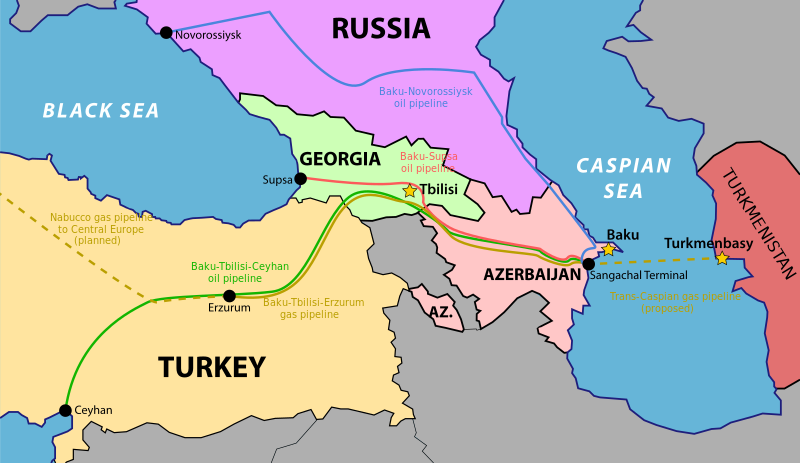Re: The Rise of the Russian Empire: Russo-Armenian Relations
Well, in 'theory' it can provide Armenia with much needed peace and stability, as it also elevates Yerevan's status to a major/pivotal player in the region. Since the union in question is economic/political in nature and would recognize Russia's primacy in the region, Armenia does not have much to fear from it - in theory. As I said earlier, because Turkey is vulnerable, Moscow has been trying to drive a wedge between Ankara and the West. It seems to be working, thus far. So, with the political situation in Georgia and the Black Sea region unpredictable/unstable Moscow and Ankara are forced to seek alternative routes for their bilateral trade. This is where Armenia can be important for them. Armenia can potentially benefit from all this. But at what cost? I think it would be an immense mistake if official Yerevan decided to totally abandon its genocide recognition agenda (Hai Dat). Nonetheless, I think all this is good news for the status of Nagorno Karabagh. With Turkey closely engaged with Armenia and Russia, chances are very-very slim (virtually nonexistent) that Azerbaijan will attempt a military solution to their problem.
What can Moscow do? They totally control our gas/oil imports. They control our nuclear reactor to a great extent. They control our economy to a great extent. They control our military to a great extent. They control our politicians to a great extent. So, use you imagination... To put it in a further perspective, with all the western support (military, financial and political) Tbilisi had at its disposal, what was it able to do against Moscow? What has Azerbaijan, with all its oil wealth, been able to do against Moscow? The reality is, Armenia is in absolutely no position to "disobey" Moscow. What our leadership should be doing instead is using all its assets to diligently and persistently lobby Kremlin officials for the preservation of Armenia's national interests. We urgently need political activism in Moscow. Sadly, I don't see this happening.
A realistic look at the situation:
Turkish President Abdullah Gul’s decision to arrive in Yerevan is conditioned by drastic changes in the geopolitical situation due to Russia’s recognition of Abkhazia and South Ossetia, Director of the Institute of Oriental Studies at the RA Academy of Sciences, prof. Ruben Safrastyan told a PanARMENIAN.Net reporter. “In an attempt to resume the normal course, Turkey offered a ‘Caucasian platform’. Moreover, it wants to gain a foothold while Russia increases its presence in the Caucasus. That is why Gul agreed to pay a visit to Yerevan. However, the basics of Turkey’s policy toward Armenia will not be changed,” he said. The importance of Gul’s visit to Armenia shouldn’t be exaggerated, according to him. “The Armenian President has done right. Under the circumstances, Turkey just tries to pursue a more flexible policy towards Armenia. I do not think that Ankara will sacrifice its national interests to relations with Azerbaijan. Furthermore, don’t forget about the Armenian Genocide resolution that is likely to be put on agenda again, with Democrats coming to power,” prof. Safrastyan said. As to the possibility of Gyumri-Kars railroad startup, he said, it’s quite real, because Russia is interested in the project, which will somehow suspend Kars-Tbilisi-Baku initiative.
Source: http://www.panarmenian.net/news/eng/?nid=26870
Originally posted by Lucin
View Post
So with that said, if Armenia 'disobeys' Moscow (considering Russia is behind all this) and makes her realize of her unwillingness to engage in such a scenario, how can Moscow retaliate? Not a big deal anyway; it's not like Armenia is turning her back to Russia and looking to the West like Georgia did.
A realistic look at the situation:
Ruben Safrastyan: importance of Gul’s visit to Armenia shouldn’t be exaggerated
Turkish President Abdullah Gul’s decision to arrive in Yerevan is conditioned by drastic changes in the geopolitical situation due to Russia’s recognition of Abkhazia and South Ossetia, Director of the Institute of Oriental Studies at the RA Academy of Sciences, prof. Ruben Safrastyan told a PanARMENIAN.Net reporter. “In an attempt to resume the normal course, Turkey offered a ‘Caucasian platform’. Moreover, it wants to gain a foothold while Russia increases its presence in the Caucasus. That is why Gul agreed to pay a visit to Yerevan. However, the basics of Turkey’s policy toward Armenia will not be changed,” he said. The importance of Gul’s visit to Armenia shouldn’t be exaggerated, according to him. “The Armenian President has done right. Under the circumstances, Turkey just tries to pursue a more flexible policy towards Armenia. I do not think that Ankara will sacrifice its national interests to relations with Azerbaijan. Furthermore, don’t forget about the Armenian Genocide resolution that is likely to be put on agenda again, with Democrats coming to power,” prof. Safrastyan said. As to the possibility of Gyumri-Kars railroad startup, he said, it’s quite real, because Russia is interested in the project, which will somehow suspend Kars-Tbilisi-Baku initiative.
Source: http://www.panarmenian.net/news/eng/?nid=26870














Comment